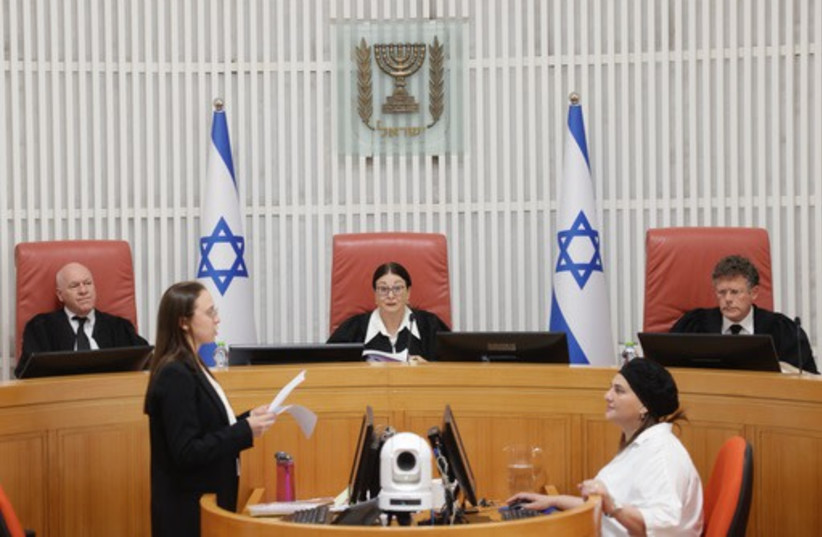“Incapacitate,” was emblazoned on large red balloons floating above the High Court of Justice entrance in Jerusalem on Thursday, as the justices heard petitions calling to strike down the incapacitation law because it was allegedly passed to improve Prime Minister Benjamin Netanyahu’s legal situation, but gaps in the arguments as wide as those between the balloons and the court below appeared under challenge by court President Esther Hayut.
Hayut and Vice President Uzi Vogelman repeatedly challenged petitioners and the Attorney-General’s representative to explain the connection between the incapacitation law, which changed the conditions for when a prime minister could be deemed incapable of service, to that of Netanyahu’s corruption trial conflict of interest agreement. Hayut asked for petitioners to demonstrate how the law itself had bad applications.
Hayut appeared to agree with the Knesset Legal Adviser Yitzhak Beret when he argued that there was no legal impact on the conflict of interest agreement by changing incapacitation provisions so that they specified it was activated for health reasons.
The conflict of interest agreement applied before, and it still applies after the law’s passing. Hayut also noted that the Attorney-General’s Office had said in previous publications that “incapacitation was not on the table” as a recourse for conflict of interest violations.
The Attorney-General’s representative argued “we’re not looking at what the Attorney-General thinks about it, but what the prime minister and head of the government coalition thinks.”

Netanyahu believed that he could be deposed through the previous incapacitation procedure, the representative argued. On March 23, the same day that the law has been passed, he has said that there were no longer limits for his involvement in the judicial reform.
Netanyahu's lawyer, Michael Ravillo, argued that he didn't mean that he would be casting aside the conflict of interest, but Hayut dismissed this, saying that the intent was obvious.
Netanyahu’s forming of a government in 2020 was conditioned by a conflict of interest agreement because he was under trial for three corruption charges. As part of the deal, he was restricted from involving himself in the appointment and promotion of judges, law enforcement and other legal officials that could potentially influence his cases.
A key element of the judicial reform was a change to the system in which judges were appointed. The attorney-general had warned Netanyahu that the conflict of interest agreement prevented him from involvement in this endeavor.
MQG has long history of saying Netanyahu was unfit for service
Dr. Eliad Shraga, the head of the petitioning NGO Movement for Quality Government in Israel, complained that he had been before the court three years prior warning that a person with three corruption charges could not serve as prime minister. His organization has filed many petitions against alleged conflict of interest violations and the judicial reform.
The attorney-general’s representative argued that the law was a deeply personal law created for his benefit. It was worse, he argued, than that of the amendment that allowed Shas chairman Arye Deri to assume a ministerial position despite his suspended prison sentences.
Hayut acknowledged the personal motivations, which were explicitly expressed by Likud party members —they were seeking to protect Netanyahu. Beret said that politicians have many reasons guiding their statements and actions, and that the content was what was important. There were different degrees of how personal a law was, and the law did apply widely to more than just Netanyahu.
“The purpose is to fill the lacuna,” said Beret, explaining that the amendment added much needed details.
Hayut was skeptical, saying that the law was not passed to fix the legislative gap, but on behalf of Netanyahu.
The passing of a law for personal benefit was an abuse of the Knesset’s constitutional authority, the Attorney-General’s representative argued. Petitioners argued that the law was against constitutional norms. Basic Laws are passed for the benefit of the state, and establishing government powers, rules, and structures.
Shraga said that these changes constituted the changing of the rules of the game in play, affecting the terms of Netanyahu's service as he was in office. The law was passed extremely quickly, which only highlighted the personal nature of the bill.
The abuse was so extreme, said the Attorney-General’s representative, that it obliged the court to strike it down. The court has never before struck down a basic law amendment, but the attorney-general’s office has also never before sanctioned judicial review of a basic law. The representative said that he wasn’t expecting the law to be struck down in a historic moment, given that only three Justice presided over the hearing, in contrast to the 15 set to sit on the bench for the reasonableness standard law hearing in September.
Ravillo argued that the court didn't have the authority to engage in judicial review of basic laws. Vogelman disagreed, saying that the court indeed had the power.
Shraga argued that the law abused the basic laws, and that they were not intended to be implemented so often. He said that if the abuse of basic laws was not reined in, they would see Netanyahu passing the quasi-constitutional legislation to protect himself from prison time.
The MQG head compared himself to the Roman senator Cato the Elder who ended every speech with a call to destroy Carthage — his own call to eradicate corruption, he claimed. Shraga said that the law was part of an agenda that was ruining to country. He listed off ways in which the government was damaging the economy, society, and rule of law, but was cut off short by Hayut who demanded that he make a legal argument.
Hayut’s comment was followed by an audience member heckling Shraga for his criticism of the government. Outside, where MQG had set up the balloons, protesters from various organizations railed against the supposed evils of the law.
